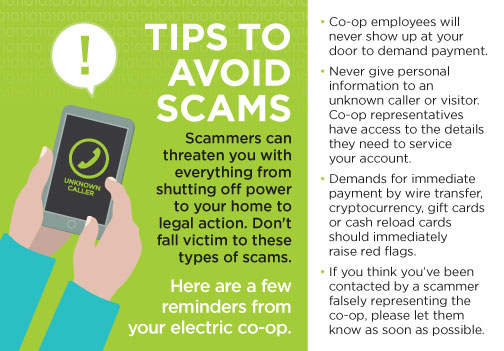Stopping Scams for Better Service
Our increasingly connected world is giving scammers more opportunities to connect with unsuspecting consumers, and local authorities, utilities and other businesses are working overtime to keep people informed. They suggest that ‘if you see something, say something,’ is a vigilance adage that can help prevent you, your family or your business from being victimized.
“The Federal Trade Commission has been hearing about scammers impersonating utility companies in an effort to get your money,” said Lisa Lake, a federal consumer education specialist. “Your reports help us fight these scams.”
Electric cooperatives are among the businesses and consumer organizations supporting Utilities United Against Scams (UUAS). The international consortium of electricity, natural gas, water and sewer providers, and trade and industry associations is sharing information on payment scams, identity theft, sales and service schemes.
Imposter scams are the most common type of fraud reported to the Federal Trade Commission (FTC), according to UUAS officials. “Impersonators call homes and small businesses demanding payment for supposedly delinquent bills and threatening to terminate service.”
The frequency of the incidents picks up during peak heating and cooling seasons, in part because consumers are most concerned when temperature extremes increase the urgency of maintaining utility service.
Variations on the scam are also becoming more common. Rather than making an initial claim that a consumer owes an outstanding balance, some scammers are now claiming an overpayment is the reason for a telephone call to a consumer. They will make contact in an attempt to get banking information so they can process a refund.
“Never give banking information over the phone unless you place the call to a number you know is legitimate,” wrote the FTC’s Lake in an FTC blog.
There has also been an uptick in door-to-door scams by people claiming to represent utility providers like your electric co-op. Representatives knock or ring the doorbell offering to replace or repair a meter or other device, or solicit personal information to sign a consumer up for programs that could reduce their energy bills.
They may try to charge you for the phony service, sell you unnecessary products, collect personal information for use in identity theft or simply gain entry to steal valuables, officials said.
High-pressure demands are a common tactic in many of the schemes. Urging immediate decisions or actions, like immediate payment, particularly by a specific option like a gift card, wire transfer, cell phone or third-party computer app should raise serious concerns.
Utility-connected scams are common, because utility services are so common. Lighting, heating, water and sewage services are all essential to modern living, so any threat of service disconnections can provoke a lot of anxiety.
Your first defense is personal awareness of your account status, including knowing whether balances are up to date. This is becoming more important as scammers use more automatic dialers or robocalls to phish for potential marks.
“Even if the caller insists you have a past due bill, that’s a big red flag,” said Lake, offering an alternative response. “Contact the utility company directly using the number on your paper bill or on the company’s website. Don’t call any number the caller gave you.”






Leave a Reply
Want to join the discussion?Feel free to contribute!